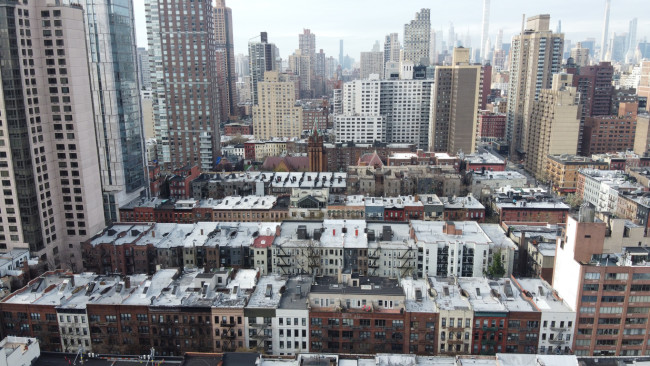With both NYC rents and mortgage rates rising, does it make more sense to buy or rent in NYC now?
New York City rents are higher than ever, and mortgage rates have jumped. Does it make more sense financially to buy or rent in NYC now?
There are many expenses that should factor into your calculations, including mortgage payments and carrying costs as well as your long-term life plans, our experts say.
Rents have skyrocketed, with the median rent in Manhattan reaching $4,000 for the first time. Buyers who need financing, on the other hand, are shocked by how much more expensive it is to borrow now. The average 30-year fixed loan mortgage rate reached 6.3 percent last week after a low of 3.5 percent in January. In pricey areas including New York City, the typical new mortgage payment has spiked 52 percent over the past six months, according to Fortune.
"With mortgage rates rising sharply and mortgage lenders' credit standards higher than normal—which they have been since the great financial crisis—many potential home buyers are being pushed into the already tight rental market, keeping rents high," says Jonathan Miller, president and CEO of appraisal firm Miller Samuel.
It's expensive no matter what you do—so how to calculate whether buying or renting makes more sense for your finances?
First, consider what kind of property you are interested in buying, and where.
"There was not a huge uptick in prices in certain categories, so it depends on what market segment you're looking in," says Deanna Kory, a broker at Corcoran. "Prewar co-ops on the Upper West or Upper East Side did not increase much in value, so currently many of those properties are well priced and could likely increase in value in future markets."
Another important factor is how long you anticipate staying in your apartment, whether it's one you buy or rent.
"If the answer is just a year, perhaps renting is the best option. If the answer is two years or more, it may be time to look at purchasing a home," Kory says. "While interest rates are increasing, relative to historical rates over the last 20 years, they are still very low. So now may be a great opportunity to take advantage of still reasonably low rates, and should rates decrease significantly, you can always refinance."
And if you plan to hold onto your apartment for many years, you're more likely to see returns on your investment.
"The longer you own your home, traditionally, the more valuable your home becomes," says Tate Kelly, a broker at Compass. "Also, if you have a fixed-rate mortgage, you know exactly what you’ll be paying on a monthly basis for as long as you own your home, whereas with renting, you never know what kind of increases will happen in the future."
Moreover, in periods of economic inflation, having a fixed-rate loan is particularly valuable. Of course, in addition to monthly mortgage costs, you must factor in a number of other expenses: the apartment's purchase price, your tax payments, your monthly carrying charges, and more.
However, adjustable rate mortgages, or ARMs, are getting a second look in this economy. An ARM has an interest rate that adjusts over time based on the market. They're not the same financial product that tripped up so many borrowers during the 2008 financial crisis—more safeguards have been added. Melissa Cohn, regional vice president and executive mortgage banker at William Raveis Mortgage, expects to see a resurgence in adjustable rate mortgages or ARMs.
There are some adjustables, Cohn says, that work like a hybrid fixed rate. “You’re locking the rate for a period of five, seven, or 10 years and the rate only begins to adjust after that,” she previously told Brick, adding that you can refinance any time. For more intel, see "3 ways NYC buyers can offset the cost of a pricier loan."
Looking at what your debt-to-income ratio would be after buying is especially important.
"In New York, if your condo or co-op carrying costs would exceed 30 percent of your monthly income or hinder your ability to continue to save, you should probably opt to rent and continue to save where possible," says Jesse Daniel James, an agent at Compass. "In some cases, the carrying costs of purchasing a unit are more of a liability, especially when you factor in taxes and common charges and those are more than you would pay to rent a similar unit."
Trouble at home? Get your NYC apartment-dweller questions answered by an expert. Send your questions to [email protected].
For more Ask an Expert questions and answers, click here.
You Might Also Like




























